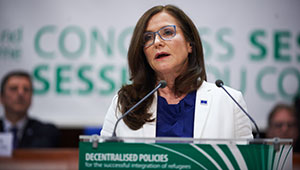32nd Session, 28-30 March 2017
28 to 30 March 2017 - Strasbourg, France

Communication by the President of the Chamber of local authorities
Anders Knape : "Political dialogue is an essential part of the work of the Chamber of Local Authorities"
Communication by the President of the Chamber of regions
Gunn Marit Helgesen: "Regional self-government is a way to enhance democracy"
- The Congress presents a recommendation on the local elections in Bosnia-Herzegovina
- Anders Knape: 'Political dialogue is an essential part of the work of the Chamber of Local Authorities'
- Gunn Marit Helgesen: 'Regional self-government is a way to enhance democracy'
- Council of Europe’s Congress adopts report on the situation of mayors in Turkey
- Moldova: Congress examines an information report on elections in the Popular Assembly of the Autonomous Territorial Unit of Gagauzia
- Local Democracy in Iceland
- Local democracy in Malta
- Local democracy in Estonia
- New Congress‘ Checklist to prevent misuse of administrative resources during elections
- Strengthening local government through direct applicability of the European Charter of Local Self-Government in domestic legal systems
- Local and regional democracy in Finland
- 32nd Session of the Congress focused on migration, citizen participation and local and regional democracy in Europe
- Mihhail Korb, Minister of Public Administration of Estonia
- Jón Gunnarsson, Minister of Transport and Local Government, Iceland
- Jari Partanen, State Secretary for the Ministry of Local Government and Public Reforms of Finland
- Stefan Buontempo, Parliamentary Secretary for Local Government of Malt
- Nils Muižnieks, Commissioner for Human Rights of the Council of Europe
- Mokhtar HAMMAMI: “Tunisia is extending its hand to all of Europe”
- Mohamed BOUDRA: “The Mediterranean joins Europe and Africa, such is our desire and yours"
- Migration: Congress adopts report on the role of local authorities in reception and integration
- Management of migration flows now an ongoing feature on the political agenda of European border regions
- Declaration against anti-Gypsyism: the Congress calls on local and regional authorities to take a stand
- Debate in the Chamber of Local Authorities: “The reception of unaccompanied minor child migrants in European cities”
- South-Mediterranean Partnership: the Congress receives delegations from Morocco and Tunisia during the 32nd Session

Report CG32(2017)15
Presentation by Manuela Bora
Video
File: 32nd Session of the Congress
- Diminuer la taille du texte
- Augmenter la taille du texte
- Imprimer la page
MediaBox is a mobile studio of multimedia resources allowing live radio interviews and video recordings for the web. Congress members can offer this tool to their press contacts who will have access free of charge to all the facilities on offer. Journalists can also use it directly for the coverage of the Congress Session.
Information on the obligations of Congress members, as well as practical details (travel, refunds, interpretation and translations) are available on the "Members' Area" page.
Table Office
[email protected]
Institutional Communication Unit
Dmitri Marchenkov




